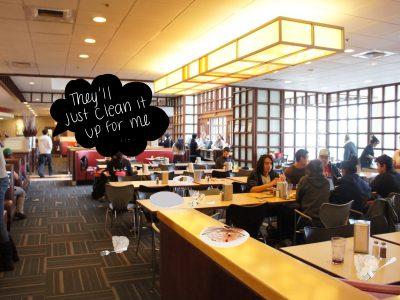There is something in the air at Boston University—and no, it is not the refreshing springtime aroma—but rather the pungent scent of entitlement seething from all four-corners of campus. From students leaving dirty dishes at dining hall tables to completely disrespecting communal bathrooms, we are left to wonder — is empathy something that can be taught?

After this weekend’s fight in the west campus dining hall — where a physical altercation ensued between a dining hall worker and a student — it appears tensions have reached an all-time high, and benevolence has hit a new low.
With 10,468 hired employees, and over 2,500 work study students, BU has a vast network of people who are dedicated to the maintenance and upkeep of the University with a reputation for its prestige. But perhaps this attitude of esteem amongst the University’s students has fostered an atmosphere of entitlement.
BU is one of the most expensive east coast schools, with an annual tuition surmounting just over $82,000—a number that continues to rise. This exchange of service and payment creates a “faculty and staff work for ME” mentality for many students, and it has created a noticeable gap when it comes to human decency.
We’ve all seen it at one place on campus or another, even if we have neglected to say something.
In some cases, these instances are more deliberate — students verbally disrespecting the dining hall staff, taking pictures or filming them without their consent or simply talking to them in a demeaning tone.
Lesser known is the more unspoken ways in which students show their lack of disregard for both the staff and fellow residents. Many note the apparent build-up of trash in their commonrooms, tables smeared with various food substances in the dining halls and the unimaginable states some of the shared dorm bathrooms are left in.
But what creates this problem? What causes adult students — who know the obvious difference between right and wrong— to act so belligerently and without compassion?
BU’s distinguished reputation has led many to enter the school with a superiority complex that stays for the long haul. Leading many to view service workers as less than.
Another probable cause is BU’s colossal wealth divide between the students it admits. The median income for families is $141,000, and around 61% of all admitted students come from the top 20% of earners. There is an inherent privilege in being able to afford a school with a price tag as egregious as BU’s. Select groups of students will not have to enroll in a federal work study job, or even gain employment off campus. That itself is an advantage.
Our upbringing has a significant impact on how we view the world. Perhaps this is why there are such varied differences in how students approach social hierarchy. Therefore, the definition of common decency may vary for people who have never been in the bottom percent of earners, or worked in the food service and retail industries.
This is not to make a gross generalization about upper and middle class BU students, because certainly, wealth is not a sole determiner of character.
In fact, for as many bad instances some of us have witnessed, there have been equally as many wholesome interactions amongst students and staff. Walking into Marciano Commons you might witness playful banter occuring between the chefs and students. Other times, you might see facility members and students referring to each other on a first name basis, or striking up casual conversation in the hallways of Warren Towers.
Though kindness and respect are the bare minimum in terms of expectations, they are surely always appreciated — especially in times where it seems like the balance between good and evil are tipping.
At the forefront, there is the ancient “respect your elders” sentiment to consider. But age shouldn’t be a determining factor in treating others with consideration. It should be the simple fact that they’re human beings.
Things do not have to be as polarized as they seem. While there may not be a singular way to amend this issue, the entire student body can benefit from knowing you don’t need a reason to be kind to others.
This editorial was written by Opinion Editor Analise Bruno